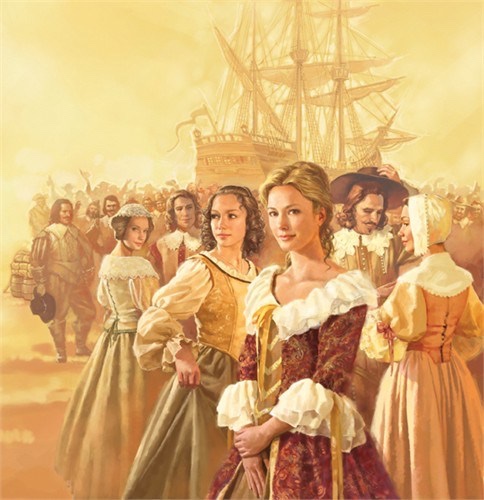| |
Date |
Event(s) |
| 1 | 1620 | - 1620—1640: The Great Migration to America
The Great Migration to America
|
| 2 | 1634 | - 1634—1662: Before the King’s Daughters: Filles a Marier
The Filles à Marier refer to the marriageable girls who immigrated to New France between 1634 and September 1663 seeking a better life. Unlike the Filles du roi, their passage wasn't paid for by the French crown, nor did they receive the “king’s gift” when they married. Although less well known than the Filles du Roi, most people with French-Canadian ancestry have at least one of these brave women as their ancestors.
 Filles a Marier Filles a Marier
|
| 3 | 1640 | - 22 Oct 1640: Signing of the Dover Combination
This agreement, known as the "Combination of the People of Dover to Establish a Form of Government," was a significant early step towards self-governance in the American colonies.
|
| 4 | 1642 | - 1642—1653: Iroquois Wars
The Beaver Wars (Mohawk: Tsianì kayonkwere), also known as the Iroquois Wars or the French and Iroquois Wars (French: Guerres franco-iroquoises) were a series of conflicts fought intermittently during the 17th century in North America throughout the Saint Lawrence River valley in Canada and the Great Lakes region which pitted the Iroquois against the Hurons, northern Algonquians and their French allies. As a result of this conflict, the Iroquois destroyed several confederacies and tribes through warfare: the Hurons or Wendat, Erie, Neutral, Wenro, Petun, Susquehannock, Mohican and northern Algonquins whom they defeated and dispersed, some fleeing to neighbouring peoples and others assimilated, routed, or killed.
|
| 5 | 1675 | - 1675—12 Apr 1678: King Philip's War
King Philip's War (sometimes called the First Indian War, Metacom's War, Metacomet's War, Pometacomet's Rebellion, or Metacom's Rebellion) was an armed conflict in 1675–1676 between a group of indigenous peoples of the Northeastern Woodlands and the English New England Colonies and their indigenous allies. The war is named for Metacomet, the Pokanoket chief and sachem of the Wampanoag who adopted the English name Philip because of the friendly relations between his father Massasoit and the Plymouth Colony. The war continued in the most northern reaches of New England until the signing of the Treaty of Casco Bay on April 12, 1678.
|

